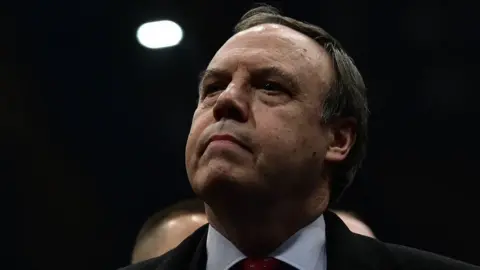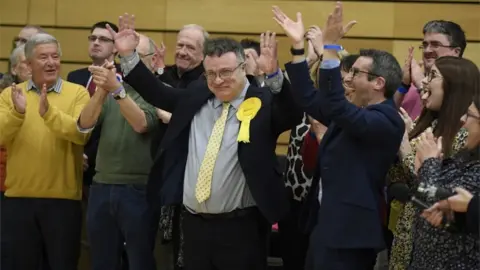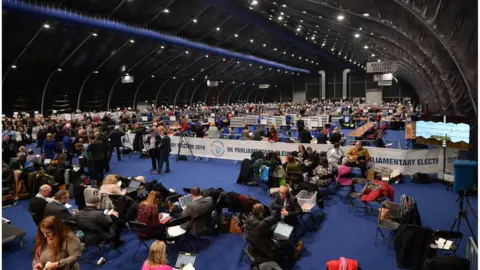General election 2019: 'Bruising defeats' for DUP and Sinn Féin
 Pacemaker
PacemakerThis election has set the bar for unpredictable results, even by recent standards in Northern Ireland.
In 2017, the Democratic Unionist Party (DUP) and Sinn Féin ended up with all but one of the 18 Westminster seats allocated to Northern Ireland.
This time they have both suffered some bruising defeats.
Out of all the Northern Ireland parties the DUP had the most to lose.
After the last general election, it found itself to be a kingmaker, securing 10 seats and holding the balance of power in a hung Parliament.
But as the exit poll declared Boris Johnson was on course for a big majority, some DUP faces already looked downbeat.
What followed was to be a bruising night for the unionist party, dropping from three seats in Belfast to just one.
It had already been facing a tough fight to retain its South Belfast seat but the effect of losing Nigel Dodds, the party's deputy leader, in North Belfast, is much more significant.
He had held the seat since 2001 and was regarded as the DUP's most experienced and savvy operator in the House of Commons.
It had been expected to be a close fight but in the end Mr Dodds lost by 1,943 votes to John Finucane of Sinn Féin.
It is worth remembering the nationalist parties had agreed a pro-Remain electoral pact in North Belfast - the SDLP for the first time agreed not to stand a candidate.
It appears to have benefited both parties with the decision in return paying off for the SDLP in South Belfast, where Sinn Féin agreed not to stand in order to maximise the pro-Remain vote to unseat Emma Little-Pengelly of the DUP.
That pact did not apply in Foyle, however, where SDLP leader Colum Eastwood unseated Sinn Féin's Elisha McCallion and she saw a huge decrease in her vote - that will be a bitter pill to swallow.
 PA Media
PA MediaMr Eastwood had argued that in order to effect change MPs need to take their seats - an argument against abstentionism that voters in Foyle clearly backed.
Given the SDLP lost all three of its Westminster seats in 2017, winning back South Belfast and Foyle - both with massive majorities - makes them the comeback kids of this election.
Meanwhile the Alliance Party surge continues.
It was the only party not to stand aside in any constituency as part of an electoral pact, a decision it argues has paid off with its vote up across the board.
There were shockwaves when it first emerged in North Down that the Alliance Party's Stephen Farry was on course to take the seat vacated by independent unionist Lady Hermon.
 PA Media
PA MediaMany commentators had predicted the DUP's Alex Easton, who came a close second in 2017, would secure it.
Few bet that the Alliance surge witnessed in the council and European elections - which use a different voting system than first-past-the-post - would translate to a seat for the party on the green benches.
Not only did he win the seat but the party's deputy leader took an even bigger vote than Lady Hermon did two years ago.
The Ulster Unionist leader Steve Aiken, having only taken over a month ago, is already in a tough spot and faces some difficult choices going forward.
He ended up in third in the race for East Antrim, miles behind the DUP and the Alliance Party.
He may also come to regret standing aside for the DUP in North Belfast - when he had originally intended to run candidates in all 18 constituencies but bowed to pressure from within unionism and faced threats from loyalist paramilitaries.
 Pacemaker
PacemakerFor the first time, unionism no longer has a majority at Westminster or Stormont - a statistic many would have believed unthinkable just a few years ago.
And what about the national picture - what does that mean for Northern Ireland?
It looks like Boris Johnson will be able to press ahead with his Brexit deal through Parliament in spite of opposition from the DUP - the party's influence is gone and its concerns about the withdrawal agreement will probably fall on deaf ears.
It was noticeable that the DUP MPs who did retain their seats used their victory speeches to urge the return of power-sharing in Northern Ireland.
After the last general election the DUP and Sinn Féin were riding respective waves of success at Westminster and felt no need to go back to Stormont.
Two and a half years on, with devolution still not back in place, perhaps some voters used their ballot to punish the big two parties this time.
Another round of talks is due to begin on 16 December aimed at kick-starting Stormont.
If it fails the government has insisted a new Northern Ireland Assembly election will be called.
Given the latest results the DUP and Sinn Féin might not be keen on facing the wrath of some voters at the ballot box again so soon.
And anyway, indications during the campaign pointed to the two parties already moving towards some kind of compromise.
The question now is what exactly that compromise will entail and just how soon they will reach it.
